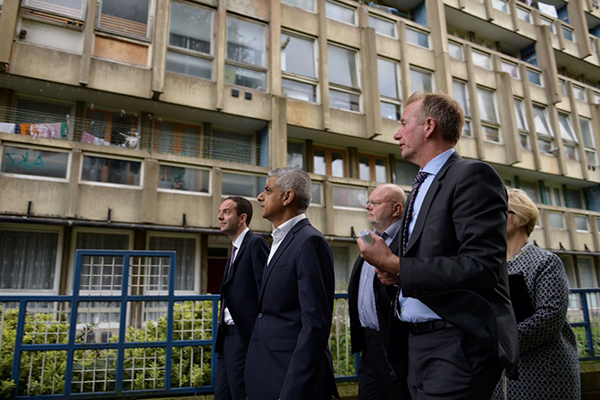You are viewing 1 of your 1 free articles
G15: resident ballots will have a ‘significant effect’ on estate regeneration
The introduction of resident ballots will have a “significant effect” on London’s largest housing associations, the chair of the G15 group has said.
London mayor Sadiq Khan made a major U-turn on resident ballots for estate regeneration on Friday morning, proposing that councils and housing associations receiving funding from his office would have to carry out ballots of residents before demolishing homes on estates.
Paul Hackett, chair of the G15, which represents London’s largest associations, told Inside Housing: “This will have a significant effect on G15 members, who are some of the biggest organisations involved in estate regeneration across the capital. At this stage, we’re preparing our submission to the mayor’s consultation.
“All G15 members believe that engaging residents effectively in estate regeneration is fundamental to the success of any regeneration project.
“It’s a principle that we’ve always adhered to. All of our successful regeneration projects have that as a key feature.”
The proposal is a significant shift in policy from the mayor, whose draft guidance on estate regeneration urged “caution around using ballots”, saying they “can risk turning a complex set of issues that affects different people in different ways over many years into a simple ‘yes/no’ decision at a single point in time”.
The latest proposals will be out for consultation until April.
Nick Yandle, policy leader at the National Housing Federation, said: “It’s vital that tenants’ views are at the heart of regeneration projects in their community and we will be engaging with the consultation process.
“As this new plan is developed, it must also not be forgotten that many people who desperately need an affordable home are homeless people, who often have no voice at all and may not currently live in the area being regenerated.”
Sir Steve Bullock, executive member for housing at London Councils, added: “All London boroughs recognise the importance of thorough and timely engagement with residents on estate regeneration schemes of all kinds and we look forward to seeing the detail of these proposals.
“We are very aware of the need to genuinely and meaningfully engage with residents throughout the process of regeneration from start to finish, and of the need to build new homes, particularly genuinely affordable homes.”
Political pressure to introduce ballots has grown in recent months, with the London Assembly recently voting unanimously in favour of the policy. Tom Copley, Labour’s London Assembly housing spokesperson, seconded that motion.
Mr Copley said: “Estate residents are generally the only group of people who face the prospect of having their homes demolished, so I strongly welcome the mayor’s decision to require ballots where demolition takes place as a condition of funding for regeneration schemes.
“Estate regeneration, when done well, can deliver better-quality homes and more affordable housing. But without resident support, schemes can face being blighted from the start. I’m pleased that the mayor has listened to community groups, as well as the unanimous voice of the London Assembly.”











